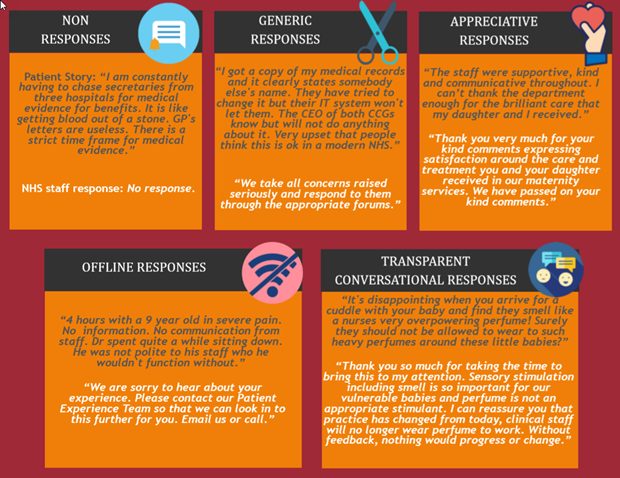
A quick look at the Care Opinion home page will show that around 75-80% of the stories shared have at least one response (rising to around 98% in Scotland). And while all responses are good… well, some are more good than others.
We know that both the fact of a response, and the quality of that response, matter to people. For example, in our 2017 survey one story author commented: “I got a comprehensive reply which went into detail about the issues I raised. The feedback was most welcome and I only hope that the NHS has the funds to correct the issues raised.”
But another wrote: “To have the appropriate people read my story and then completely dismiss me rather than take responsibility for their failings drove me in to a deeper depression.”
I blogged in 2018 about research from Rebecca Baines at Plymouth University which examined what “a good response” looks like from the patient/service user point of view. That study identified 19 features which people felt would be important to them in an online response to their feedback. We recently added new reporting for subscribers to help them track how they are doing on some of these aspects of response quality.
More recently, research by Lauren Ramsey and colleagues at Leeds University has used framework analysis to identify five different types of response posted on Care Opinion: non-responses, generic responses, appreciative responses, offline responses and transparent conversational responses.
Download the full poster: lauren-ramsey-response-typologies.pdf
There is no doubt that sometimes a poor response can seem worse than no response at all. In a recent example, a patient posted about an upsetting interaction during a visit to the emergency department. The story was clear and explicit about what was wrong, and provided enough information for the story to be passed to the relevant team for a response – and hopefully, to prompt reflection and change.
But the response was generic: “If you would be willing to provide further details, we can then advise the appropriate management team of your experience so they can make any necessary improvements.” In ignoring the content of the feedback, the response suggested that it had barely been read – adding a further insult to this patient’s already poor experience, as well as missing the clear opportunity for improvement.
Is continuing to post generic responses really good enough?
At Care Opinion we will continue to work for better responding than this, through training and encouragement for individual responders, new tools for responders, sharing guidance and good practice, and supporting further research in this area. We will also work towards a world where feedback can more consistently and effectively translate into better experiences for future patients.
But there is a limit to what we can do: sooner or later, health and care providers themselves must decide whether, in 2019, they will accept that the Internet has now become a mainstream way to give feedback about healthcare. They must decide whether continuing to post generic responses (or no response at all, in one in four cases) is really good enough.
So my hope for the year ahead is this: that many more health services will now seize the opportunity that online feedback offers, rather than continuing to miss it.
New year, and continued resolution
New year, and continued resolution https://www.careopinion.org.uk/resources/blog-resources/1-images/e22061b5306f4d2e8941c2dad7a67890.png Care Opinion 0114 281 6256 https://www.careopinion.org.uk /content/uk/logos/co-header-logo-2020-default.pngUpdate from Care Opinion
Posted by James Munro, Director of Research & Development, Care Opinion, on
Response from Jane Danforth, Involvement & Experience Officer, Involvement, Experience and Volunteering Team, Nottinghamshire Healthcare NHS Trust on 2 Jan 2019 at 15:39
This is timely James, thank you.
As well as sharing this blog with our subscription at Notts. Healthcare on our CO monthly 'News' Intranet update, it also provides an additional opportunity. I’m going to share it at our Patient Experience Band 5 Nurse Preceptorship education event this month.
I agree with the comments about generic and offline responses and this opportunity is really too good to miss. The language in these responses can, in some cases come across as lazy, or at worst (and depending how the author feels when receiving a generic response) as not caring. Whilst this is more than likely not to be true it has the potential to put people off posting future feedback on Care Opinion. If we say we are listening then we need to show it.
A generic reply doesn't really help anyone it merely acknowledges that feedback has been received No response is not something we do at Notts. Healthcare but we can always do better when it comes to timeliness and completing the feedback loop. Offline responses can be disappointing as maybe the author really doesn’t want to make contact and it can close the feedback down with no evidence of any outcome.
Thankfully we have lots of staff who post some great responses but completing promised changes by updating the website is still an uphill battle!
Improvements from feedback certainly warrant a bit of effort but surely better outcomes for all (and I include staff in this) is what we are striving for? Improving the quality of responses is crucial as we continue to use online feedback for improvements and change.
New Year, and continued resolution at NottsHC? To seize the opportunity and not miss it!
Response from Pioneer on 4 Jan 2019 at 15:33
Dear James,
Thank you for that eloquent and timely piece. It is important to realise that when people go above and beyond the call of duty, to be met with a lack of respect and indifference (at best) is ever so slightly galling.
I run a small Charity supporting elderly, disabled and bereaved in the far North of Scotland, and if required, we will provide a 24-hour service. When I was asked to drive an 84 mile round trip in the middle of the night by a member of the NHS, to provide patient transport, I willingly obliged.
I sought no gold stars, but I did not expect indifference. The lack of courtesy and respect was stunning. I wrote, hoping that an explanation would be forthcoming from the Complaints Manager.
However, I received a response which contained no apology, no regret, no desire to try harder. There was not even a token nod to the fact that I had saved the NHS some money.
Could Care Opinion vet these replies, and, where the response could be inflammatory ask the question:" Have you heard and understood the issues?"
It might prevent the generic answer, which I have fortunately never had to endure until now on Care Opinion. Responses have generally been prompt, courteous and investigative.

